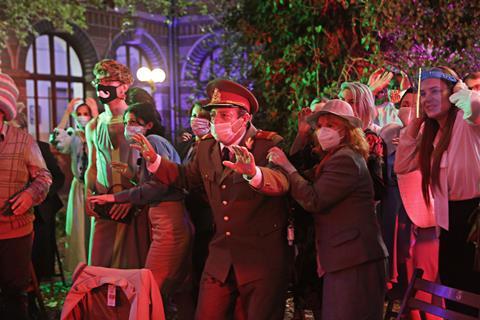
The Russian government has banned the release of Radu Jude’s Golden Bear winner Bad Luck Banging Or Loony Porn in the country due to its “promotion of pornography”.
Distributor Capella Film has been refused an exhibition license for the film by the Ministry of Culture despite its inclusion in full at the state-backed Moscow International Film Festival (MIFF) in April.
“We are permitted to show the film without a censorship permit,” festival programme director Kirill Razlogov told Screen at the time.
It is not yet known if Capella will appeal the decision.
Russia’s ban on propaganda of non-traditional sexual relations, which was signed into law by President Vladimir Putin in June 2013, has affected productions as diverse as Harry McQueen’s Supernova, starring Colin Firth and Stanley Tucci, and the animated short Out, the first Pixar film to feature a gay main character.
Supernova’s Russian distributor World Pictures had originally released the film in a shortened version - which removed a sex scene between Firth and Tucci’s characters – to obtain an exhibition license, but then bowed to pressure from the film’s director, local film critics and the LGBTQ community in Russia, to successfully apply for a license to then show the unexpurgated version from mid-April in 10 cinemas.
However, others have been less successful. In 2019, the ministry blocked plans for the theatrical release of four of the films from Ilya Khrzhanovsky’s Dau extravaganza including Dau. Natasha, which made its world premiere at the Berlinale in 2020. The film’s production company Phenomen Films unsuccessfully appealed twice against the decision. Moscow’s Arbitration Court upheld the decision in September 2020, confirming the films would not be released because of “material promoting pornography”.
Similarly, “numerous scenes of a pornographic nature“ in Gaspar Noé’s Love led the Ministry of Culture to refuse to issue a license for Premium Film”s planned release in September 2015 with an 18+ certificate and in a “softer“ version. The film had been shown once in Russia in a surprise late-night screening at MIFF at the end of June only a few weeks after its premiere in Cannes.
And Serbian first-time filmmaker Maja Milos’ Clip did not make it into Russian cinemas in the summer of 2012 after the Ministry condemned the Rotterdam prize-winner for “foul language, scenes of drug and alcohol use, as well as pornographic material“ and refused distributor Kino Bez Granits’ thet all-important exhibition license.
However, the alleged promotion of pornography is not the only argument levelled by the Ministry of Culture against filmmakers as a reason to refuse a film the exhibition license.
At the beginning of this year, Maryana Kalmykova, one of the students of Alexander Sokurov’s studio, saw her documentary Doazuv/Border denied a license and then banned from screening at the Artdocfest in April. The Ministry considered that film about the territorial conflict between the Republic of Ingushetia and the Chechen Republic in 2018 “contains materials that violate Russian legislation on counter-terrorism and extremist activities“.







![The Brightest SunScreen[Courtesy HKIFF]](https://d1nslcd7m2225b.cloudfront.net/Pictures/274x183/3/5/0/1448350_thebrightestsunscreencourtesyhkiff_312678.jpg)

















No comments yet